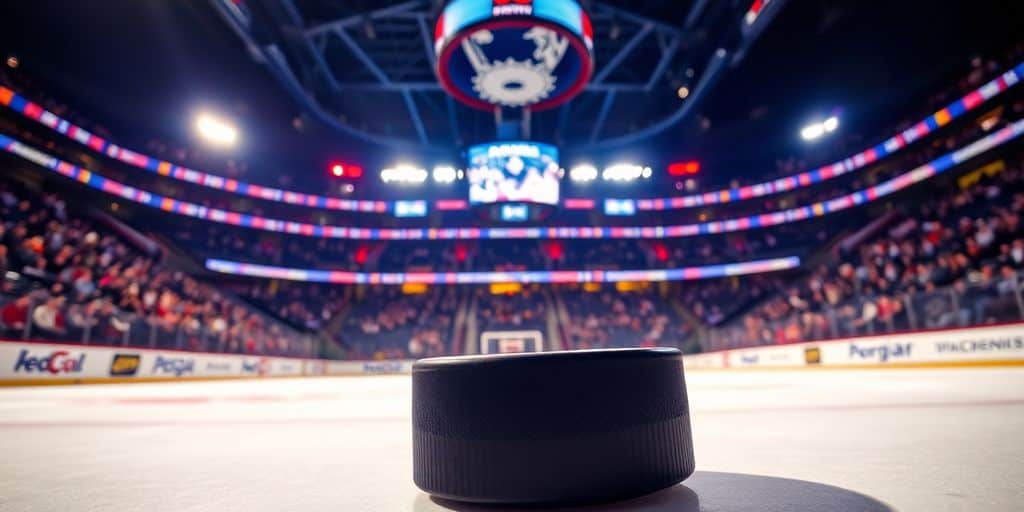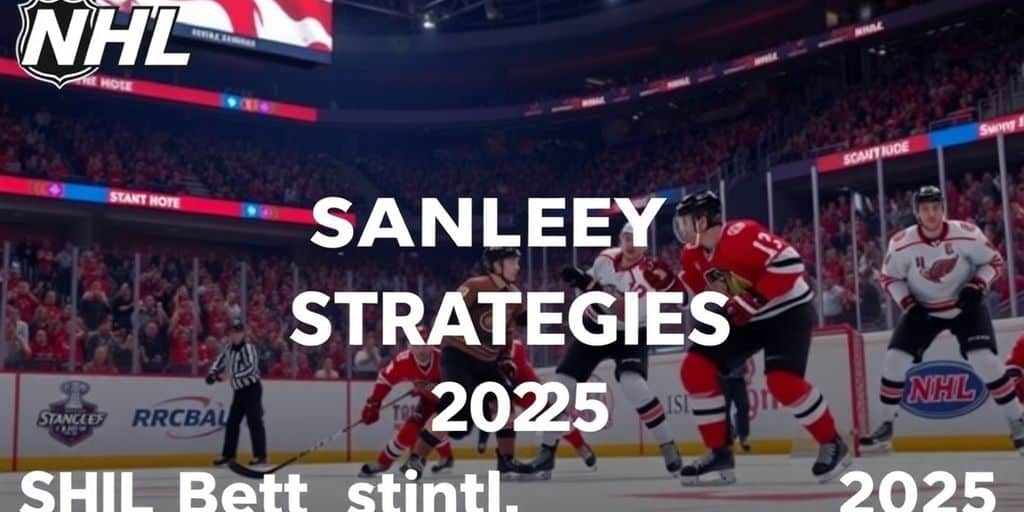Betting on the Stanley Cup can be thrilling, but it’s not just about picking a team and hoping for the best. With the right strategies, you can boost your chances of winning and make the most out of your bets. This guide will break down some smart approaches to take when placing your Stanley Cup bet in 2025, so you can enjoy the action while keeping your bankroll in check.
Key Takeaways
- Timing is key; bet early to get better odds.
- Analyze goaltending matchups for potential upsets.
- Manage your bankroll wisely; don’t risk too much on any single game.
- Look for value in prop bets and in-game betting.
- Stay objective; don’t let fan bias cloud your judgment.
Understanding The Stanley Cup Bet Landscape

The Importance Of Timing Your Bets
Timing is super important when you’re thinking about betting on the Stanley Cup. Getting in early can mean better odds, but it also means taking on more risk. Think about it: betting before the season even starts gives you the best potential payout, but a lot can change between October and June. Injuries happen, teams underperform, and surprise contenders emerge.
On the flip side, waiting too long can mean missing out on value. If a team is looking dominant heading into the playoffs, their odds will shrink, and the potential reward won’t be as high. It’s a balancing act between getting good odds and having enough information to make an informed decision. Maybe you see a futures market opportunity.
Analyzing Team Performance Trends
Don’t just look at a team’s overall record. Dig deeper! How have they been playing lately? Are they on a hot streak, or are they limping into the playoffs? What’s their record against other playoff teams? Do they perform better at home or on the road? These are the kinds of questions you need to ask yourself.
Consider these points:
- Recent performance (last 10-15 games)
- Head-to-head records against potential opponents
- Home vs. away splits
- Performance after injuries or trades
Analyzing team performance trends is not just about looking at wins and losses. It’s about understanding the underlying factors that contribute to a team’s success or failure. Look at their offensive output, defensive solidity, special teams performance, and goaltending. All these things can give you a more complete picture of a team’s true potential.
Identifying Value Bets Early
Finding value is the name of the game. A value bet is when you believe the odds offered by the sportsbook are higher than the actual probability of that outcome occurring. This often means looking for teams that are being underestimated by the public or the oddsmakers. Maybe a team had a slow start to the season but has turned things around. Or perhaps a team is in a tough division, making their record look worse than it is.
Here’s a simple table to illustrate the concept:
| Team | Implied Probability (Odds) | Your Estimated Probability | Value? |
|---|---|---|---|
| Team A | 40% | 50% | Yes |
| Team B | 60% | 50% | No |
| Colorado Avalanche | 20% | 10% | No |
Remember, identifying early bets requires research, analysis, and a bit of contrarian thinking. Don’t just follow the crowd; do your homework and find those hidden gems.
Key Factors Influencing Playoff Outcomes
Goaltending Matchups And Their Impact
Goaltending can make or break a team’s playoff run. A hot goalie can steal a series, while a struggling one can sink a team’s chances. It’s not just about save percentage; consider the goalie’s experience, their performance against specific opponents, and their ability to handle pressure. Playoff hockey is a different beast, and some goalies thrive under the spotlight while others falter. Look at how goalies have performed in past playoff series, and if they have a tendency to let in soft goals at critical moments. This goaltending analysis can be the difference between a winning and losing bet.
Home-Ice Advantage In The NHL
Home-ice advantage is often talked about, but its impact in the NHL playoffs can be overstated. While teams generally perform better at home, the difference isn’t as significant as in other sports. Here’s what to consider:
- Familiarity: Teams are more comfortable in their home arena, with familiar surroundings and routines.
- Crowd Support: The energy from the home crowd can provide a boost, especially in close games.
- Last Change: Home coaches get the last line change, allowing them to dictate matchups.
However, playoff hockey is intense, and teams often split games on the road. Don’t automatically assume the home team will win. Look at the team’s overall record, their performance on the road, and the specific matchups in the series.
The Role Of Special Teams
Special teams – power play and penalty kill – become even more important in the playoffs. Games are often tight-checking and low-scoring, so capitalizing on power-play opportunities and shutting down the opponent’s power play is key. Here’s why:
- Fewer Penalties: Referees tend to call fewer penalties in the playoffs, so power-play opportunities are at a premium.
- Intense Penalty Killing: Teams focus on blocking shots and disrupting passing lanes on the penalty kill.
- Game-Changing Goals: A single power-play goal can swing the momentum of a game or even a series.
Consider these factors when evaluating special teams:
| Metric | Description
Effective Bankroll Management Techniques
Setting A Realistic Betting Budget
Okay, so you’re thinking about putting some money down on the Stanley Cup. Cool! But before you even look at the odds, you gotta figure out how much you can actually afford to lose. Seriously. Treat your betting budget like an entertainment expense, not an investment. Don’t even think about using money you need for rent, bills, or groceries. Once that money is gone, it’s gone.
- Calculate your disposable income after all essential expenses.
- Allocate a fixed percentage (e.g., 1-5%) of this income for betting.
- Divide your total budget by the number of weeks in the playoffs to determine a weekly limit.
It’s easy to get caught up in the excitement, especially during the playoffs. Setting a budget beforehand helps you stay grounded and prevents you from making rash decisions that could hurt your finances. Think of it as protecting yourself from yourself.
Determining Bet Sizes For Each Game
Alright, you’ve got your budget. Now, how much do you bet on each game? A common strategy is to use a percentage-based system. This means you bet a small percentage of your total bankroll on each wager. For example, if you have a $500 bankroll, you might bet 1-2% ($5-$10) per game. This helps protect you from big losses if you have a bad streak. Also, consider the confidence level of your bet. A bet you feel really good about might warrant a slightly larger stake, but never go overboard. Remember, consistency is key. You can also shop for promotions to maximize your bankroll.
Avoiding Chasing Losses
This is where things get tricky. You’re down a few bets, and you’re feeling the urge to win it all back. Resist! Chasing losses is a surefire way to empty your bankroll. It leads to impulsive bets and poor decision-making. Instead, stick to your pre-determined strategy. If you’re on a losing streak, take a break. Step away from the computer, go for a walk, and clear your head. Come back later with a fresh perspective. Remember, there’s always another game. Don’t let emotions dictate your betting strategy. Here’s a simple table to illustrate the dangers:
| Scenario | Initial Bet | Loss | Next Bet (Chasing) | Outcome | Total Loss/Gain |
|---|---|---|---|---|---|
| Standard Betting | $10 | -$10 | $10 | Loss | -$20 |
| Chasing Losses | $10 | -$10 | $20 | Loss | -$30 |
| Disciplined Approach | $10 | -$10 | $10 | Win | $0 |
- Set a stop-loss limit: Decide how much you’re willing to lose in a single day or week.
- Take breaks: If you hit your stop-loss limit, step away from betting.
- Review your strategy: Analyze your bets to identify areas for improvement. Don’t just blindly increase your stakes.
Utilizing Advanced Betting Strategies
Hedging Your Bets For Safety
Hedging is like having a safety net. It’s a strategy where you place additional bets on the opposite outcome of your original bet to reduce risk and secure a profit, regardless of the game’s final result. Let’s say you bet on a team to win the Stanley Cup at the start of the season. As the playoffs progress and your team advances, the odds of them winning decrease. You can then place a bet on another team to win, guaranteeing yourself some winnings no matter what. It’s all about mitigating potential losses and locking in gains.
Exploring Prop Bets For Added Value
Prop bets, or proposition bets, are wagers on specific events within a game that aren’t directly tied to the final outcome. Think of things like: Will a certain player score a goal? How many shots on goal will a particular player have? Will there be a power-play goal in the first period? These bets can offer great value because they often rely on factors that aren’t fully reflected in the standard moneyline, puck line, or over/under odds.
Here’s a quick look at some common prop bet categories:
- Player Props: Goals, assists, shots on goal, penalty minutes.
- Game Props: Total goals, first team to score, will the game go to overtime?
- Period Props: Goals scored in a specific period, winner of a specific period.
Prop bets can be a fun way to engage with the game, but it’s important to do your research. Look at player stats, team tendencies, and recent performance to make informed decisions.
In-Game Betting Opportunities
In-game betting, also known as live betting, lets you place wagers while the game is in progress. The odds change in real-time based on what’s happening on the ice. This opens up a whole new world of opportunities. For example, if a team comes out strong in the first period, their odds to win might shorten. Conversely, if a team takes an early lead, you might find value in betting on the underdog to make a comeback. Keep an eye on momentum shifts, injuries, and coaching decisions to make informed bets. It’s fast-paced and requires quick thinking, but it can be very rewarding if you know what you’re doing. You can even explore futures betting during the season, as teams rise and fall.
Navigating The Emotional Rollercoaster Of Playoffs
The Stanley Cup Playoffs are a wild ride, no doubt about it. The intensity is cranked up to eleven, and every game feels like a do-or-die situation. As a bettor, it’s easy to get swept up in the excitement, but that’s when mistakes happen. You’ve got to keep a cool head and make smart choices, even when your favorite team is on the brink.
Staying Objective Amidst Fan Bias
Okay, let’s be real. If you’re a die-hard fan, it’s tough to bet against your team. But sometimes, that’s exactly what you need to do. Playoff emotion is a rollercoaster, and adding money to the mix can cloud your judgment. Recognize your biases and try to see things from a neutral perspective. Are you betting because you genuinely believe your team will win, or because you want them to win? There’s a big difference.
Recognizing Popular Team Overvaluation
Big-name teams often get more love than they deserve, especially from casual fans. This can inflate their odds, making them less attractive bets. Think about it: everyone wants to back the Stanley Cup favorites, but that doesn’t mean they’re always the best value. Look for situations where a less-heralded opponent might be a smarter pick, even if it’s not the popular choice. Data over hype, always.
Embracing The Unpredictability Of Hockey
Hockey is chaotic. That’s part of what makes it so great, but it also means that anything can happen in the playoffs. A lucky bounce, a hot goalie, or a questionable call can change the entire course of a series. Don’t get too high after a win or too low after a loss.
Remember that the playoffs are a marathon, not a sprint. There will be ups and downs, surprises and disappointments. The key is to stay focused on your strategy and not let emotions dictate your decisions.
Here are some things to keep in mind:
- Watch for the Heartbreaker Loss Effect: Teams that lose a close game in overtime might be demoralized for the next game. Be cautious about backing them immediately.
- Series Game States – Desperation Factor: Game 3 when a team is down 0-2 coming home is often a maximal effort spot for the trailing team.
- Bankroll Discipline: It’s easy to want to have action on every game every night because it’s so exciting. But choose your spots. There are typically multiple games a day in early rounds – you don’t need to bet them all.
At the end of the day, playoff betting should be fun. Embrace the craziness, trust your analysis, and enjoy the ride!
Maximizing Returns With Futures Betting
Futures betting is all about predicting long-term outcomes, like who will win the Stanley Cup. It’s a fun way to stay engaged throughout the season, but it requires a smart approach to really see those returns.
When To Place Futures Bets
Timing is super important. The earlier you place your futures bet, the better the odds you’re likely to get. Think about it: before the season starts, there’s a lot of uncertainty. No one knows who will be the top contenders, so the payouts are higher. As the season progresses and teams start to separate themselves, those odds shrink. For example, that team that was +1400 in October might be -125 by the time the Finals roll around. You’re getting way less value at that point.
Understanding Odds Movement
Odds are constantly changing based on team performance, injuries, and even just public perception. Keep an eye on how the odds shift. If you see a team trending upward, their odds will probably get shorter. This is where your knowledge of the game comes in. If you think a team is undervalued, even with shortening odds, it might still be a good time to jump in. Also, don’t forget to shop around at different sportsbooks. You might find slightly better odds on the same team at different places. This is especially true for Stanley Cup futures.
Strategies For Cashing Out
So, you made a great futures bet early in the season, and now your team is in the Stanley Cup Final. Congrats! Now you have a decision to make: let it ride or cash out early? One strategy is to hedge your bet. This means betting against your original pick to guarantee a profit no matter what. Let’s say you bet $100 on Team A at +1400 to win the Cup. They’re now in the Final against Team B. You could bet on Team B to win the Cup. If Team B is at, say, +105, you could wager around $682 on them. This would guarantee you around $717 profit no matter who wins. If Team A wins, you get $1400 from your futures bet but lose $682 on the hedge, netting you $718. If Team B wins, you lose your initial $100 but win $717 on the hedge, netting you $617. It’s a way to lock in a win. You don’t have to hedge the full amount. Some people hedge just enough to cover their initial stake, so they either win a lot or break even.
Futures betting can be a wild ride. There will be ups and downs, unexpected injuries, and surprise performances. The key is to stay informed, manage your bankroll wisely, and not get too emotionally attached to your picks. Remember, it’s a long game, and the goal is to make smart, calculated decisions that will pay off in the end.
Recent Trends And Rule Changes In NHL Betting

Impact Of New Rules On Scoring
Okay, so the NHL is always tweaking things, right? One of the biggest things to watch is how new rules affect scoring. For example, they might crack down on obstruction or change goalie equipment. These changes can lead to more goals in the regular season. But don’t get too excited. The playoffs are a different beast. Teams tighten up, and the refs tend to let more go. So, that regular-season scoring surge? It might not translate when the stakes are higher. Keep an eye on how these rules are actually playing out on the ice, not just what the league says they should do. You can use NHL season tools to keep up with the trends.
Adjusting Strategies For Recent Trends
So, how do you adjust your betting strategy? Well, first, don’t blindly follow trends. Just because scoring was up last year doesn’t mean it will be this year. Look at the underlying reasons. Is it a rule change? A specific team’s offensive style? A change in coaching? Once you understand why something is happening, you can make a more informed bet. Also, pay attention to how teams are adapting. If a team is known for its offense, but the new rules favor defense, they might struggle. Here are some things to consider:
- Team’s adaptability to new rules.
- Coaching strategies in response to league changes.
- Historical data versus current performance.
Keeping Up With Player Injuries
Injuries are a huge deal in hockey. A star player going down can completely change a team’s chances. But it’s not just about the big names. A key defenseman or a solid goalie getting hurt can also have a major impact. The trick is to stay on top of the news. Follow team reporters, check injury reports, and see what the coaches are saying. But don’t just look at who’s out. Consider who’s stepping in. A backup goalie might be a hidden gem, or a young player might get a chance to shine. It’s all about finding those little edges that other bettors might miss.
It’s important to remember that the NHL is unpredictable. Even the best teams have bad nights, and even the worst teams can pull off upsets. That’s what makes it exciting, but it also means you need to be smart about your bets. Don’t get too caught up in the hype, and always do your research.
Wrapping It Up: Your Path to Smart Betting
So, there you have it! Betting on the Stanley Cup can be a wild ride, but with the right strategies, you can make it work for you. Remember to keep an eye on the odds, do your homework, and don’t be afraid to hedge your bets when the time is right. It’s all about finding that balance between having fun and being smart with your money. As the playoffs heat up, trust your instincts and enjoy the thrill of the game. Good luck, and may your bets be as solid as a well-timed slap shot!
Frequently Asked Questions
What is the best time to place a bet on the Stanley Cup?
It’s smart to place your bets early in the playoffs when the odds are more favorable. Waiting until the finals can lead to lower returns.
How can I manage my betting money wisely?
Set a budget for how much you want to spend on betting. Stick to it and only bet a small percentage of your total money on each game.
What factors should I consider when betting on a team?
Look at the team’s recent performance, their goaltending situation, and whether they have home-ice advantage.
What are futures bets and when should I use them?
Futures bets are long-term bets on who will win the Stanley Cup. It’s best to place these bets early in the season or playoffs for better odds.
How can I avoid emotional betting during the playoffs?
Stay objective and try not to let your favorite teams influence your bets. Focus on data and analysis instead.
What recent changes in the NHL should I be aware of?
Stay updated on any new rules, scoring trends, and player injuries, as these can affect betting outcomes.











